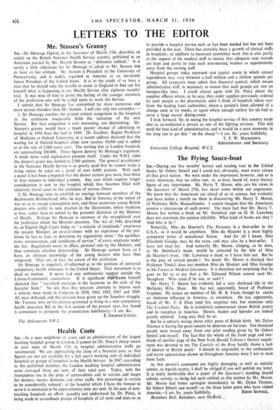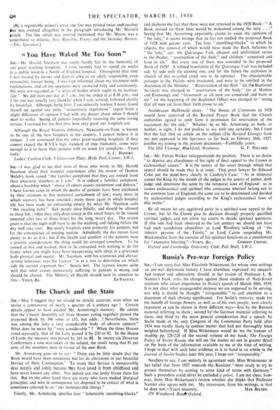The Flying Sauce-boat
SIR,—During our five months' lecture and reading tour in the United States, Sir Osbert Sitwell and I could not, obviously, meet every citizen
of that great nation. We were under the impression, however, and so is every American, that we either met, or, at least, heard of, every literary figure of any importance. Mr. Harry T. Moore, who airs his views in
the Spectator of March 27th, has never come within our cognisance.
We know that the Americans are ahead of us in science, but evidently you have stolen a march on them in discovering Mr. Harry T. Moore,
of Wellesley Hills, Massachusetts. I cannot imagine that the Americans possess a microscope of such power. The mere fact that Mr. Harry T. Moore has written a book on Mr Steinbeck and on D. H. Lawrence does not constitute his opinion infallible. What kind of books are they ? And who is he ?
Naturally, Miss du Maurier's The Parasites is a best-seller in the U.S.A., as it would be anywhere. Miss du Maurier is a most highly
competent writer of sensational fiction. And for all I know, Miss
Elizabeth Goudge may be the same, and may also be a best-seller. I have not read her. And naturally Mr. Moore, clinging, as he does,
to Mr. Steinbeck's mane, would be attracted by the title of Miss du Maurier's book. (Mr. Lawrence is dead, so I leave him out. But he is the prey of certain people ) No doubt Mr. Moore is shocked that
Professor Tindall does not mention Miss du Maurier and Miss Goudge in his Forces in Modern Literature. It is therefore not surprising that he goes so far as to say that a Mr. Edmund Wilson cannot read Mr. Maugham. Who cares if he can, or can't ?
Mr. Harry T. Moore has evidently led a very sheltered life in the Wellesley Hills, Mass. He has not, apparently, heard of Professor Toynbee. He makes no mention of Mr. W. B. Yeats, though he exerts
an immense influence in America, as elsewhere. He has, apparently, heard of Mr. T. S. Eliot (and this surprises me), but mentions only The Cocktail Party. He is completely uninstructed about British poetry and its reception in America. Messrs. Auden and Spender are indeed greatly admired. Long may they be so.
But he is entirely wrong about other poets of British birth. Mr. Dylan Thomas is having the great success he deserves on his tour. Ten thousand people were turned away from one joint reading given by Sir Osbert Sitwell and myself. The fact that the whole of the front page and two- thirds of another page of the New York Herald Tribune's literary supple- ment was devoted to my The Canticle of the Rose hardly shows a lack of interest in British poets! I should be ungrateful to the enthusiastic and warm appreciation shown us throughout America were I not to state these facts.
As this person's comments are highly damaging as well as entirely untrue, as regards poetry, I shall be obliged if you will publish my letter. It is really intolerable that a paper of the Spectator's standing should submit, naively, to being fed such rubbish as this written by Mr. Moore. Mr. Moore had better apologise immediately to Mr. Dylan Thomas, Sir Osbert Sitwell and myself—as the three latest poets who have visited America.—I am, Sir, yours faithfully, EDITH Srrweu- Renishaw Hall. Renishaw, near Sheffield. , (By a regrettable printer's error one line was printed twice and' another Aine was omitted altogether in the paragraph introducing Mr. Moore's "Article. The line which was omitted mentioned that Mr. Moore was a contributor to Atlantic. New Republic, Poetry and the Saturday Review. —ED., Spectator.]







































 Previous page
Previous page